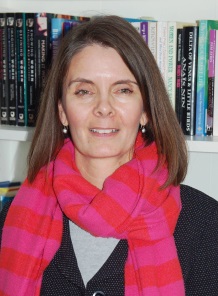Michelle Hunter
Profile
Biography
- 2018 - present: PhD student in Applied Linguistics
- 2016-17: MA in Coaching in Education (Work Based Integrated Studies) with Distinction, Chester University
- 1988-92: BA (Hons) in Business Studies, UWE Bristol
I am freelance teacher of English as a Foreign Language based in Germany, and have taught business English in companies and at Universities in and around Stuttgart for 20 years. Over that time I have developed a passion for life-long learning which has led me to York and the PhD Education programme.
Research
Research
- 'English content delivery effectiveness: how well do international students learn and non-native professors teach in EMI classes?'
- Learning and teaching difficulties can arise from individuals’ 'Affect', ie: emotions, feelings and moods (Williams, Mercer and Ryan, 2015), as well as 'Self-efficacy', i.e: individuals’ confidence in their abilities (Bandura, 1977). Thus, the intention behind this proposed study is to look at both sides of the psychological coin and investigate how teachers’ and students’ affect and self-efficacy aid or hinder their learning effectiveness in EMI classes. This study will take a primarily qualitative approach.
Supervisor
Publications
Publications
Hunter, M. (2018). Ease, Equality and Speaking in “Rounds” Positively Shapes Group Dynamics. In: Pattison, T. (Ed.) IATEFL 2018 Brighton Conference Selections. Canterbury: IATEFL.
Dobbs, B. and Hunter, M. (2018). Teacher, Trainer, Coach – What are you really? English Teaching Professional. PavPub.
Hunter, M. (2018). So what is coaching again? Business Issues. The newsletter of the business English special interest group. 99:22-23
Hunter, M. (2017). 10 ways to incorporate coaching into your lessons. ETpedia Blog, July 2017. Available at: https://www.myetpedia.com/10-ways-to-incorporate-coaching-into-your-lessons
Hunter, M. (2017). Why Coaching in ELT? Brighton: Academic Study Kit
Hunter, M. and Dobbs, B. (2016). A-Z Coaching (Photocopiable Activities). Brighton: Academic Study Kit
Wade, P., Hunter, M. and Morain, R. (2015). Coaching and Mentoring Activities for ELT. Available at: https://www.smashwords.com/books/view/603275
Hunter, M. (2015). What does an Entrepreneurial EFL Teacher look like? MELTA News, Winter Issue 87:18
Hunter, M. (2014). Can an English teacher successfully transition into soft skills training? Modern English Teacher, 23(3).
Hunter, M. (2013). Self-coaching tools for inside and outside the classroom. IATEFL Teacher Development Special Interest Group Conference Newsletter.
Hunter, M. (2013). A Lesson Plan: GROWing your business English learners. Business Issues The newsletter of the business English special interest group.
Hunter, M. (2013). A Presenting First at the BESIG Conference. In: Bicknell, R. (Ed.) IATEFL BESIG 2013 Stuttgart Conference Selections.
Presentations
April 2018: Group Dynamics and Rounds. IATEFL Annual Conference, Brighton
December 2017: How can a coaching model in the FL classroom reduce 'TTT' and increase learning? Language Education Across Borders Conference, Karl-Franzens University of Graz, Austria
November 2017: Coach Mindset. Teach with it. Learn from it. BESIG Annual Conference, Malta
April 2017, with Professor Yoany Baldarain: Experiences of building a tailor-made digital placement test for business students at an international university. BALEAP, Bristol
November 2016: What if we gave each other more time to think? TESOL France 35th International Annual Conference, Paris
November 2016: What if nobody interrupted in meetings? IATEFL BESIG 30th Annual Conference, Munich,
September 2016: Market yourself without selling your soul: The practicalities of presenting the authentic you. STEM Symposium, University of Saarland, Saarbrücken,
April 2016: Demanding Higher - Silently. IATEFL 50th Annual Conference, Birmingham,
June 2014 with Petra Greiner: Quest 3C – more than just another intercultural simulation game. Dialogin Intercultural Conference, Constance, Germany
November 2013, with James Schofield: English for Coaching at Work. IATEFL BESIG Annual Conference, Prague
June 2013: Determination is the Key to Success. Springboard Annual Conference, Milton Keynes
April 2013: Self Coaching Tools Inside and Outside the Classroom. IATEFL Annual Conference, Liverpool
June 2012: ELT and Coaching. Where is the connection" IATEFL BESIG Summer Symposium, Paris
November 2010: "What is your vision for your future?" IATEFL BESIG Annual Conference, Bielefeld, Germany
Teaching
Teaching experience
I have 20 years’ experience with in-service and pre-service learners in companies and universities in southern Germany. I enjoy the creativity of designing lesson materials and enthusiastically delivering them to groups of all sizes: from 1-to-1 to groups of 2-12 professional people, from classes of 5 to 45 students.
My main themes are English for business purposes, effective communication (including presentation skills training), coaching and personal development training. Most courses culminate in assessment measures; I have written and graded exams for all my undergraduate business English communication courses, both written and oral testing, as well as portfolio assessment.
My teaching philosophy has been indelibly influenced by Nancy Kline’s Time to Think approach to coaching to which I was introduced during a post graduate certificate in business and personal coaching. Kline’s Ten Components of a Thinking Environment became the focal point of my master’s thesis: Creating a Thinking Environment for English Language Learners. A Model for Staff Development Training.

